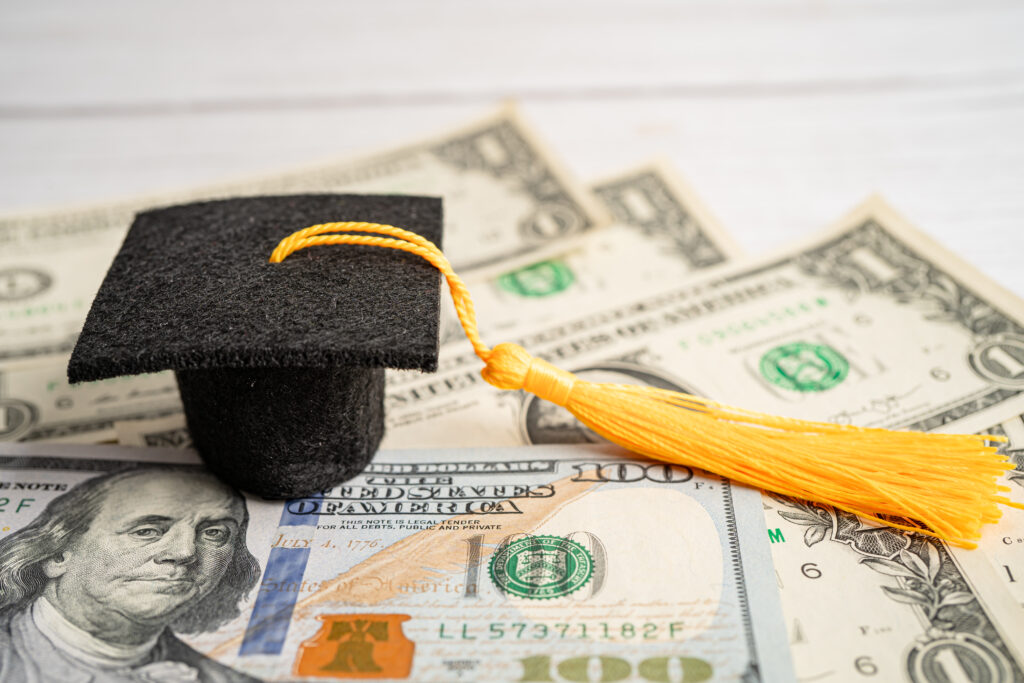College is expensive, really really expensive. We’ve covered this before, to discuss why this is, and to look at how you can make it more affordable. Now, however, there’s a significant amount of uncertainty in financial markets, which leads to all kinds of economic questions. One which is very pertinent to both parents and us is: what does all of this mean for the price of college?
In this article we’re going to explore how tariffs, and the various other knock-on economic effects of them, will impact the cost of college. The short answer is Yes, tariffs will make college more expensive. For the long answer, explaining why this is the case, well, let’s get started!
Tariffs Increase College’s Expenses
Colleges, like so many other institutions, need to buy things. This is everything from lab equipment, to books, to furnishings for classrooms and dorms, to construction materials to build new things on campus, to the food they serve in the dining halls. This stuff is sourced on a global scale, and as the cost to buy many of these products rises due to tariffs, colleges will find themselves shelling out extra.
Now, colleges can defray these costs somewhat. They may put off updating classroom desks or getting new chairs in the library; construction plans may be put on hold for a while. Some items, however, must be purchased, and colleges will have no choice but to pay the increased cost.
This is actually not likely to increase the cost of tuition itself, but to greatly impact the secondary fees; those for housing and dining. College housing is already notably expensive, and this will make it much more so. You can also expect an increase in the cost of textbooks. There are already many complaints about how much books cost at college, and this will only raise those prices.
Colleges cannot afford to simply absorb the costs of increased materials themselves, so these will be passed on entirely to students. Note that these are just the direct costs of tariffs; there are several subsidiary effects which will also impact the cost of colleges.
Colleges are Heavily Invested in Stocks
Much is made of college’s endowments, the large pools of money they can draw on for operating costs. These endowments don’t just sit in vaults, like the hoard of Scrooge McDuck; instead they are invested. Indeed, the ones who manage these investments are generally some of the highest paid employees of any college, as this report from Harvard illustrates.
As you may have noticed, tariffs caused some instability in the stock market, sending many investments tumbling. This created reverberations throughout the broader economy of course, but was also a major problem for universities.
Universities don’t want to spend the principal of their endowment; they want that money to last for perpetuity, to continue funding their operations far into the future. Instead, their goal is to only spend the income generated from their investments, through the natural growth of their portfolio. When there is a sharp downturn in the markets, however, this becomes more difficult to manage.
When this happens, universities must either dip into the principal of the investments, or look for alternate sources of revenue. They try to avoid the first; in many cases because they can’t. You see, endowments are not just one huge pile of money for universities to spend how they like, but instead many separate earmarked funds, which must be spent on specific items; a university can’t spend money earmarked for a named chair on scholarships, nor can they spend scholarship money on construction.
So as stocks tumble, colleges must find some other way to close the revenue gap; here they can turn either to private donations (which are also slowing in the face of economic uncertainty), and tuition dollars. Many colleges already depend on tuition to remain solvent; this latest squeeze will only increase those concerns, and lead colleges to pass even more costs on to students.
The Issue of Inflation
Economists agree on very little, but one thing which has a significant amount of support is that tariffs (and ensuing trade wars) are bad for inflation. This will impact the costs of everything, but college tuition is likely to spike in response as well.
Notably, college tuition has historically increased far faster than overall inflation rates, growing many times faster than one would expect simply based on how fast prices increased overall. This suggests that college tuition will increase sharply, though this may be delayed. This also depends on how sharply inflation increases, which we are still waiting to see.
This is a less proximate issue, and is likely to resolve over the next few years. Thus we expect to see tuition increase in steps, first a sharp jump based on the immediate issues we have discussed, and then an ongoing ramp-up as colleges grapple with the longer term impacts of inflation.
This is also going to impact colleges across the board, from the most expensive private schools to the much more affordable public options, and even down to local community colleges. Colleges seem like aloof and elite institutions, apart from society in most aspects, but they are still part of it, and when the entire economy is in upheaval, colleges are forced to respond as well. For students and parents, this means facing even higher tuition costs.
Final Thoughts
There are other potential concerns afoot for college funding, notably the major slashing of research budgets, but it is as of yet unclear how this will play out. These cuts are being challenged in courts, and these funds may or may not impact undergraduates directly. These are unrelated to tariffs directly, but may compound the financial problems facing universities, and contribute to them seeking more funding from tuition.
We hope that this article has given you a sense of what colleges are dealing with when it comes to the new tariffs, and how the unsteady economic landscape is liable to impact their financial situation. We expect college costs to rise, and for students and parents to be faced with ever more difficult choices when it comes to figuring out how to pay for a college education.
When applying to college, there are ways to maximize your chances of receiving aid, and ways to approach your applications to increase your odds of success. Doing this is easier with expert guidance, and that’s where Ivy Scholars comes in. If you want help on your own applications, or to review your application strategy, then schedule a free consultation with us today. We have a long history of helping students find the right college to meet their needs, and are always happy to hear from you.








